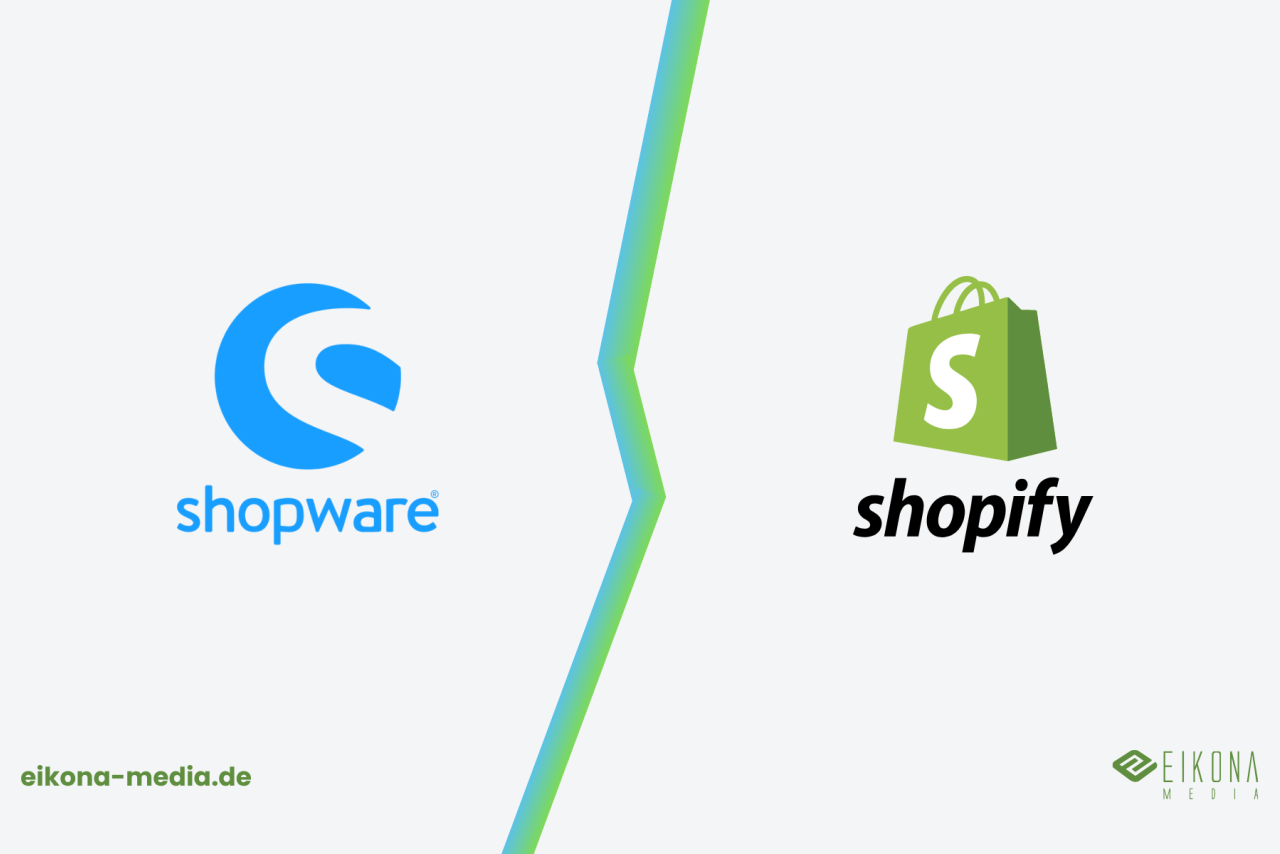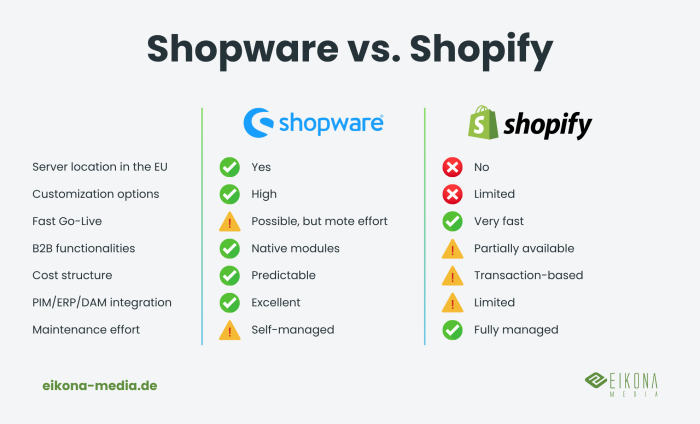Shopware or Shopify - which is better suited to your e-commerce project?

Shopware or Shopify - which is better suited to your online business? We'll show you what really matters: from time-to-market to B2B complexity. Clear, honest and direct. Read now and make the right decision!
The fundamental question: Which e-commerce software is right for you?
Shopware or Shopify? There is no clear answer, as both solutions offer different strengths. The decisive question is therefore: What do you need technically, economically and strategically?
Before you get bogged down in provider comparisons, you should clarify:
- Do you want full control and maximum customizability?
- Or would you prefer a quick solution that “just works” - without a lot of IT effort?
- Do you need interfaces to PIM, ERP, CRM or DAM?
- Do you value data protection and hosting within the EU?
- How much turnover do you generate - or are you planning?
- Do you sell in a B2C or B2B environment?
We'll show you what's important here - with a clear comparison between Shopware and Shopify. And don't worry: it won't be technically dry, but practical. With real added value for your decision-making process.
Shopware: The flexible powerhouse from Europe
Shopware is like a Swiss army knife - only digital. It comes from Germany, is GDPR-compliant and is aimed particularly at discerning retailers in the B2B and B2C sectors.
What Shopware does really well:
- Hosting in the EU: Full control over your data
- API-first approach: Ideal for connecting PIM systems such as Akeneo, DAMs such as TESSA, or ERP/CRM systems.
- Map complex business models, e.g. individual pricing logic, role models or approval workflows in B2B.
- AI: Shopware has made significant progress here with version 6 - automatic text creation, text to image, image to text, etc.
The matter of costs
Up to a GMV (Gross Merchandise Volume) of €1 million, you can use Shopware Community Edition without license fees, i.e. if your gross order volume over the instance is lower. However, hosting, updates and individual development still incur costs. But in return you get exactly what you need.
The downside
Flexibility has its price - not only in euros, but also in the form of IT resources. Updates, hosting and maintenance must be actively managed. In return, you own the entire store, including the source code. This is a real advantage, especially for specialized use cases.
Shopify: Fast, smart, scalable
Shopify is the turbo for your online store. A SaaS model (Software-as-a-Service) that lets you get started almost immediately, without your own server or development team. With the 2025 summer update, you can even get complete suggestions for your store design.
That's what makes Shopify strong:
- Quick setup with templates and ready-made payment solutions around the globe
- Large app ecosystem: perfect for social commerce, marketplaces and international sales.
- POS & Omnichannel: Unified inventory across online store, social and brick-and-mortar commerce (retail stores)
If you're a start-up or launching a new brand, Shopify is often the perfect place to start. No technical overhead, no stress with hosting, just do it.
The limitations of Shopify
- Fewer options for customization, especially compared to Shopware
- Transaction fees - even if you use your own payment service provider.
- Data storage outside the EU - this can become critical when it comes to compliance (keyword: GDPR, Privacy Shield, political uncertainties).
Decision factors in comparison
Here we go into the individual decision factors in detail.
Server location
If the server location is to be in the EU, Shopware is the right choice and a decisive criterion. The software can also be operated on your own hardware. Shopify, on the other hand, can be ruled out due to its SaaS approach.
Individuality
Shopware also gives you an advantage here, especially if you want to operate several individual stores from one database. This is where Shopware scores with its headless approach. Even if you want to work with configurators, there is no way around Shopware. Basically, you can say: the more complex the project and the higher the degree of individuality, the more obvious Shopware is as a solution.
Schneller Go-Live
Fast go-live
Shopify has the edge here, especially when it comes to small, simple projects. If only because of the new AI design options. With Shopware, you would work with an MVP (Minimum Viable Product) if you want to go fast and then expand it, for example by adding configurators.
B2B functionalities
Shopware has a clear advantage here due to its structure, even if Shopify has caught up. For example, if your B2B customers receive individual prices or you have individual delivery conditions. Shopware is the specialist here. If your B2B customers are important to you, you should choose Shopware.
Connection of third-party systems: PIM, DAM, ERP, CRM & Co.
Shopware is also ideally equipped and customizable when it comes to connecting third-party systems. You have significantly more options than with Shopify. This applies not only to product data via PIM and assets via DAM, but also to what is in your ERP or CRM, which can be taken into account or fed back. For example, if you have upper order limits or certain payment options are only available for selected customers.
Maintenance effort
Maintenance costs correlate strongly with individuality. Whenever you build something off the standard into a software, it costs money for updates and maintenance. With Shopware you need a service provider for this, EIKONA Media will be happy to assist you. You can also operate a simple store without many products and high turnover yourself with Shopify.
Cost structure
The question of costs is often less complicated from an economic point of view than it appears at first glance. With Shopify, you benefit from low entry costs and low maintenance costs. However, the running costs increase quickly, especially due to sales-dependent price components, which become very significant as sales grow.
With Shopware, the initial costs are higher. Development, setup and hosting cause additional costs, especially if you need external support. Your IT department may be able to take on some of these costs. On the other hand, the ongoing sales-related costs are significantly lower.
An example: If you pay a transaction fee of one percent to an external payment provider with Shopify, this already equates to 1,000 euros for a monthly turnover of 100,000 euros. Even entry-level packages that seem cheap quickly lose their appeal as a result. For the professional B2B version of Shopify, there are additional license costs of over 2,000 euros per month. This puts the price difference to Shopware into perspective considerably.
Our advice is therefore: compare the most important cost factors with a view to your planned sales.
The relevant points include:
- License costs per year
- Server costs and hosting
- One-off agency costs for setup
- Ongoing agency costs for support and further development
- Transaction fees for card payments
- Transaction fees depending on turnover
- Transaction costs per order
For larger projects in particular, it is worth asking the provider for specific figures. This will ensure that your calculation remains realistic. If you need support with the evaluation or a concrete offer for implementation and operation, we will be happy to assist you.
Which solution suits your project?
- You want to go online quickly, have few IT resources and don't plan any special curls.
Shopify is your thing. You get an all-in-one platform with fast time-to-market, perfect scalability and automated technology in the background. - You are a D2C brand with an international focus and your own stores.
Shopify is often a good choice here too - but: if you need marketplace integration, POS linking and sophisticated pricing logic, we'll check with you whether Shopware isn't a better fit. - You are a medium-sized company with complex processes, ERP integration and a PIM system.
Clearly: Shopware. Customizable, integrable, secure. And often no alternative, especially in the B2B sector. - Your company has a high turnover.
Attention with Shopify: the transaction fees scale with it. At a certain point, Shopware becomes significantly cheaper - we'll be happy to do the math for you.
Conclusion
Now it's up to you
Do you want full flexibility, legal security and deep integration? Shopware is your toolbox - robust, individual, future-proof.
Or do you want to get online quickly, with as little effort as possible, and are planning an international e-commerce setup?
Shopify is your speed boat - fast, stylish, ready to go.
No matter what you choose: We at EIKONA Media will support you with the implementation. From strategy to go-live. From the integration of your PIM system to the store design. And if necessary, we can help with your product texts. The main thing is that it gets you ahead.
Let's talk. And together we'll find the solution that really suits you.

